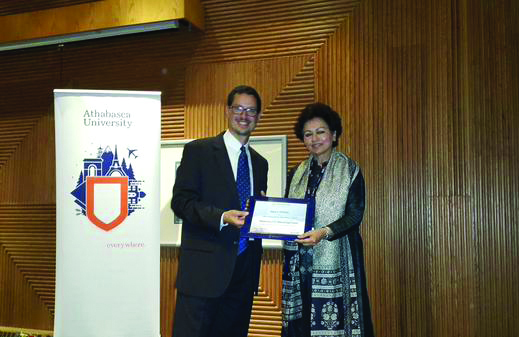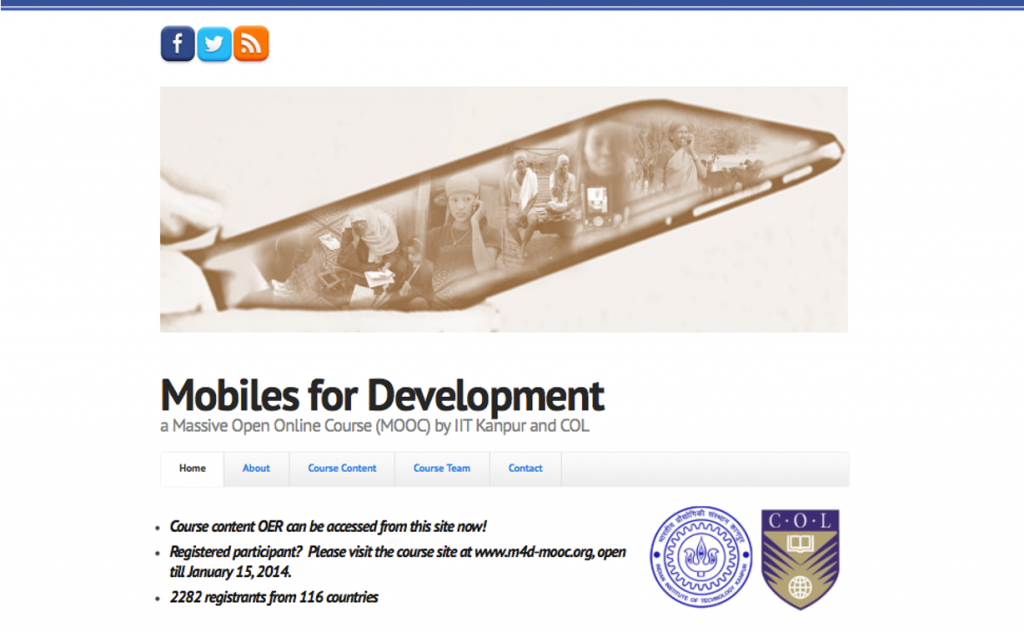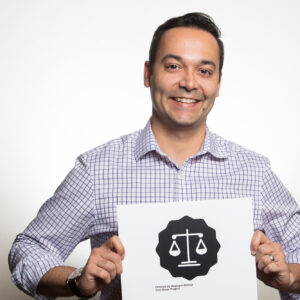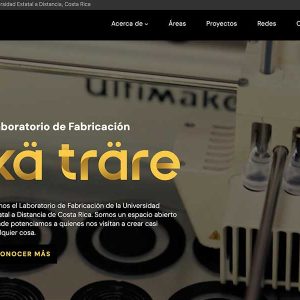The Commonwealth of Learning (COL) and the Indian Institute of Technology Kanpur (IITK) ran its first massive open online course (MOOC) on mobiles for development from 2 October to 25 November 2013. This six‐week course aimed to provide participants with an overview of mobile phones as devices that could augment sustainable development through areas such as agriculture, healthcare, communication and teacher education. The course was unique in that it jointly focused content on social and technical aspects. By addressing some of the social issues faced in many parts of the developing world, participants utilised the content knowledge they acquired to program mobile phones to develop novel applications .
The course attracted 2,282 registrants from 116 countries, 62 per cent of whom were active participants. A total of 333 participants were found to be eligible for a certificate of competence (244 participants) or certificate of participation (89). The top five countries in terms of registrants were India, Nepal, Mauritius, Grenada and South Africa. About 500 registrants were from countries in the Africa-Caribbean-Pacific regions. About 200 registrants were from the OECD countries and Eastern Europe.
Sakai, an open source platform was identified as most suitable for use as an online classroom in this course, and was also mobile-enabled so that some of the interested learners could access it from their tablets or smartphones.
All the learning materials were delivered as YouTube videos and the presentation slides and video transcripts were also made available as PDF documents. All the materials have been released as open educational resources (OER) as this is consistent with COL’s advocacy of OER for development and is one of the very few large-scale online courses to make content available as OER.
Instructors, teachers and mentors were from IIT-Kanpur, IIT-Ropar, COL, Athabsaca University and the National Institute of Bank Management (India). The design and delivery demonstrated that quality content and teaching and the high availability of online services were critical factors in keeping participants engaged in the MOOC.
A number of participants mentioned that they were able to start using some of the applications almost immediately, including: the built-in gravity sensor, for example, is now used in some families to alert when an elderly relative has an unexpected fall; the “missed call” service is used to help a traveller who has lost her/his way in a Himalayan valley; and call blasts are sued to send out medical alerts to patients (From India and Canada, a grassroots model for MOOCs, 2013).
This MOOC on Mobiles for Development demonstrated that a low-cost, open source software delivery platform combined with OER could be used effectively to provide a hybrid MOOC environment that served over 1,400 learners and did not have to use custom and “branded” MOOC platforms of the type used by well-known MOOC providers.
Online mentoring /facilitation was a key investment of time for which instructors should be trained and prepared. Open and distance learning institutions may have a significant starting advantage in offering MOOCs because of their inherent strengths with pedagogy, resources and expertise to mount large-scale learning programs.
Explore more about this awardee…

- MOOC on ‘Mobiles for Development’ receives 2015 Open Education Award for Excellence (2017, Commonwealth of Learning)
- From India and Canada, a grassroots model for MOOCs (2013, University World News)
- MOOC on Mobiles for Development Report (2014, Commonwealth of Learning)
- Mobiles for Development MOOC (2013, Internet Archive)



